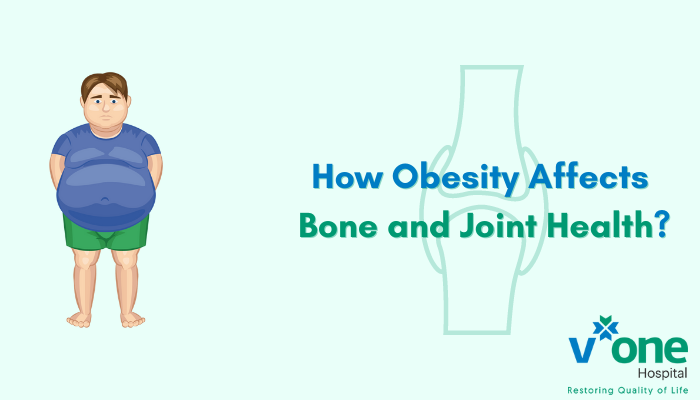Obesity and Bone Health: How Extra Weight Can Harm Your Bones and Joints
Whether it’s from a reluctance to cook or an excuse for a celebration, with more and more of us now prefer to eat out every chance we get, it’s no surprise that 5% of India’s population is morbidly obese. As unhealthy, processed food becomes more accessible and middle-class incomes rise, we observe a steep curve in obesity statistics in India.
But despite the worldwide body positivity movement, the risks posed by obesity can’t be denied. Having excessive body fat isn’t just bad for your heart, the extra weight also puts more pressure on your joints.
How Does Obesity Affect Bone and Joint Health?
Did you know that each extra kilogram of your weight exerts 4 kilograms of pressure on each knee joint with every step you take during the day? The joints in your body’s lower half bear most of your weight, so it makes sense that being overweight can lead to achy, swollen, and stiff joints later in life.
Obesity has often been found to cause soft tissue damage and even osteoarthritis, especially of the hip and knee joints. And as the cartilage within a joint degenerate, the bones start rubbing against each other and cause irritation, pain, and swelling. In fact, if you have been diagnosed with obesity, you are 20 times more likely to have to get a knee replacement at some point in your life than someone who isn’t overweight. Being obese can also create complications during surgery with chances of infection and blood clots, and affect hospitalization lengths and outcome results.
1. In the Shoulders
Obese people have poorer outcomes after seeking repair for their rotator cuff injuries.
2. In the Spine
Sometimes, when you’ve had spine surgery, spinal hardware is used to keep your spine stable as you heal from surgery.
3. In the Hand
Studies link long-term obesity to poor hand grip strength later in life and spoiled arm bone health.
4. In the Hip and Knee
As an obese individual, you may face higher rates of complication and hardware failure after total joint arthroplasty.
5. In the Foot and Ankle
The extra weight can also cause problems like flat foot, plantar fasciitis, Achilles tendonitis, or foot and ankle pain, which happen due to long-term overuse of the foot and the ankle.
If you are obese, there’s a greater chance that you might sustain a musculoskeletal injury while playing sports. This can be anything from a fracture to a meniscal tear.
Knee Replacements on the Rise
In just 5 years, the number of people getting knee replacement surgery has shot up dramatically. Today, more than 2.5 lakh Indians get a Total Knee Replacement (TKR) every year. This is 2.5 times the number of such surgeries being performed every year five years ago. While this may be attributed to technological advancements and increasing longevity, it is also true that doctors are seeing far more complications with the procedure than they did 5 years ago. Every 1 out of 10 patients getting this surgery may have complications and need revision surgery, and if you are a bit on the heavier side, it may increase your chances of such complications. Diabetes and poor blood sugar control is likely to cause complications.
But here’s the thing – if you are obese, simply losing weight may eliminate the need for surgery. Obesity truly is the enemy of bone health and joints, as it can also increase surgical and post-surgery complications, calling for extra care to reduce the risk of complications.
Losing Weight Might Improve Your Joint Pain
Studies have shown that losing weight helps decrease pain and improve function for those suffering from arthritis. Losing just 4.5 kilograms can slow the progression of knee osteoarthritis by 50%.
If you have arthritis, you can’t just reverse it or regrow cartilage with weight loss, but if you lose a little weight, it can prevent further damage and help your joints feel better. The first steps may be taking up a healthy diet and trying out exercises like swimming and water aerobics. You can also try physical therapy to help with movement. A protein-filled breakfast also helps, but it’s also important to pay attention to overeating that is brought on by stress, for which, seeing a psychotherapist may help.
Regardless of the method you choose, if you lose a little weight, you’ll be on your way to healthier and energy-filled days in no time!

